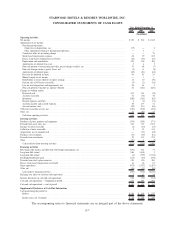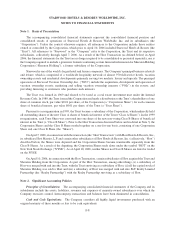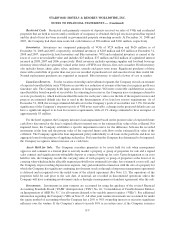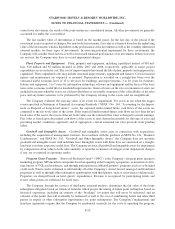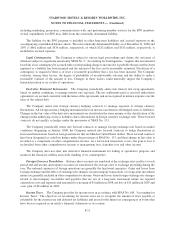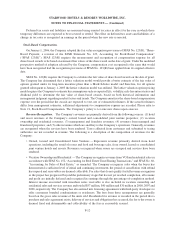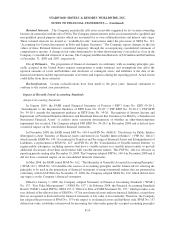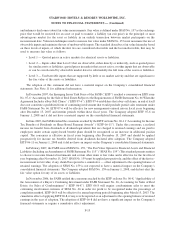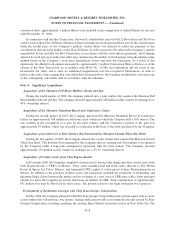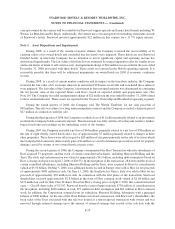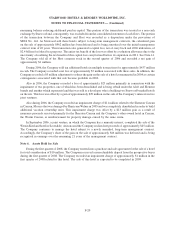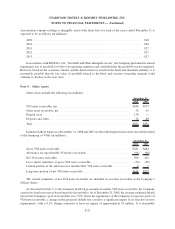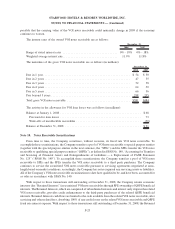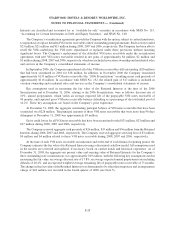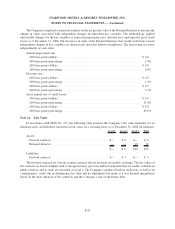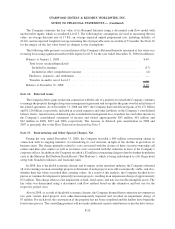Starwood 2008 Annual Report Download - page 132
Download and view the complete annual report
Please find page 132 of the 2008 Starwood annual report below. You can navigate through the pages in the report by either clicking on the pages listed below, or by using the keyword search tool below to find specific information within the annual report.In June 2006, the FASB issued Interpretation No. 48, “Accounting for Uncertainty in Income Taxes”
(“FIN 48”). This interpretation, among other things, creates a two step approach for evaluating uncertain tax
positions. Recognition (step one) occurs when an enterprise concludes that a tax position, based solely on its
technical merits, is more-likely-than-not to be sustained upon examination. Measurement (step two) determines the
amount of benefit that more-likely-than-not will be realized upon settlement. Derecognition of a tax position that
was previously recognized would occur when a company subsequently determines that a tax position no longer
meets the more-likely-than-not threshold of being sustained. FIN 48 specifically prohibits the use of a valuation
allowance as a substitute for derecognition of tax positions, and it has expanded disclosure requirements. The
Company adopted FIN 48 on January 1, 2007, and recorded an increase of approximately $35 million as a
cumulative-effect adjustment to the beginning balance of retained earnings. See Note 14 for additional information.
In December 2004, the FASB issued SFAS No. 152, which amends SFAS No. 66, and SFAS No. 67,
“Accounting for Costs and Initial Rental Operations of Real Estate Projects,” in association with the issuance of
AICPA SOP 04-2, “Accounting for Real Estate Time-Sharing Transactions.” These statements were issued to
address the diversity in practice caused by a lack of guidance specific to real estate time-sharing transactions.
Among other things, the standard addresses the treatment of sales incentives provided by a seller to a buyer to
consummate a transaction, the calculation of accounting for uncollectible notes receivable, the recognition of
changes in inventory cost estimates, recovery or repossession of VOIs, selling and marketing costs, associations and
upgrade and reload transactions. The standard also requires a change in the classification of the provision for loan
losses for VOI notes receivable from an expense to a reduction in revenue.
In accordance with SFAS No. 66, as amended by SFAS No. 152, the Company recognizes sales when the
period of cancellation with refund has expired, receivables are deemed collectible and the buyer has demonstrated a
sufficient level of initial and continuing involvement. For sales that do not qualify for full revenue recognition as the
project has progressed beyond the preliminary stages but has not yet reached completion, all revenue and associated
direct expenses are initially deferred and recognized in earnings through the percentage-of-completion method.
The Company adopted SFAS No. 152 on January 1, 2006 and recorded a charge of $70 million, net of a
$46 million tax benefit, as a cumulative effect of accounting change in its 2006 consolidated statement of income.
Future Adoption of Accounting Standards
In April 2008, the FASB issued FSP No. 142-3, “Determination of the Useful Life of Intangible Assets (“FSP
No. 142-3”). FSP No. 142-3 amends the factors that should be considered in developing renewal or extension
assumptions used to determine the useful life of a recognized intangible asset under SFAS No. 142, “Goodwill and
Other Intangible Assets.” FSP No. 142-3 is effective for financial statements issued for fiscal years beginning after
December 15, 2008 and interim periods within those fiscal years. The Company is currently evaluating the impact
that FSP No. 142-3 will have on its consolidated financial statements.
In March 2008, the FASB issued SFAS No. 161, “Disclosures about Derivative Instruments and Hedging
Activities-an amendment of FASB Statement No. 133” (“SFAS No. 161”). SFAS No. 161 requires enhanced
disclosure related to derivatives and hedging activities. Under SFAS No. 161, entities are required to provide
enhanced disclosures relating to: (i) how and why an entity uses derivative instruments; (ii) how derivative
instruments and related hedge items are accounted for under SFAS No. 133, “Accounting for Derivative Instruments
and Hedging Activities” (“SFAS No. 133”); and; (iii) how derivative instruments and related hedged items affect an
entity’s financial statements. SFAS No. 161 must be applied prospectively to all derivative instruments and non-
derivative instruments that are designated and qualify as hedging instruments and related hedged items accounted
for under SFAS No. 133 for all financial statements issued for fiscal years and interim periods beginning after
November 15, 2008. The Company is currently evaluating the impact that SFAS No. 161 will have on its
consolidated financial statements.
F-16
STARWOOD HOTELS & RESORTS WORLDWIDE, INC.
NOTES TO FINANCIAL STATEMENTS — (Continued)



